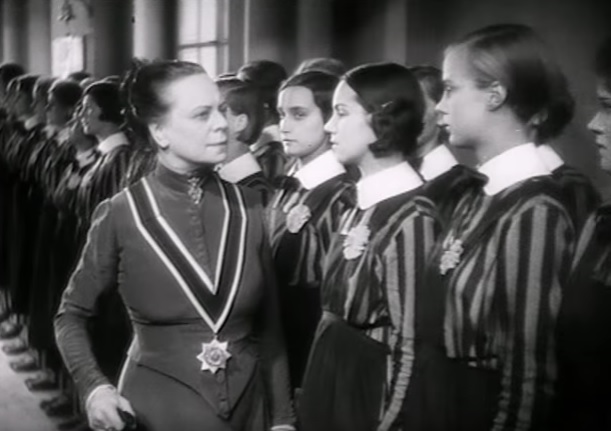 © Mädchen in Uniform (Leontine Sagan, 1931)
© Mädchen in Uniform (Leontine Sagan, 1931)
Full Marks All Round: Review of Mädchen in Uniform (1931)
Lucy Clarke, University of Edinburgh
The boarding house is a familiar location in the world of cinema. From Peter Weir’s 1975 gloriously romantic Picnic At Hanging Rock (1975) to the fairy-tale iconography of Alfonso Cuarón A Little Princess (1995), perhaps no boarding school is quite as austere as the one in Leontine Sagan’s Mädchen in Uniform (1931). A Little Princess’s Sarah Crewe might be forced into servitude after her father dies, but the school in Mädchen in Uniform goes the extra mile by starving their wards. But despite their teacher’s cruelty, the schoolgirls form an unbreakable bond of love and friendship.
Madchen in Uniform is a 1931 classic from Weimar Germany. It’s probably most well-known as one of the first films to portray a lesbian romance. When Manuela von Meinhardis (Hertha Thiele) starts at the boarding school, she is unused to the rigmarole and the discipline. She struggles to assimilate to this new environment, even though the girls in her dormitory quickly grow to love her. Her pallid, crying nature may be due to her burgeoning crush on her teacher Fräulein von Bernburg (Dorothea Wieck), a younger and kinder version of the other schoolmistresses. Fräulein von Bernburg’s nighttime ritual of kissing all of the girls on the forehead goes a little further with Manuela when she kisses her on the mouth instead. This was no accident. It soon becomes apparent that both Bernberg and Manuela are developing feelings for one another.
Amongst the rigid classical architecture and Grecian statues of gods and heroes, it is a wonder that any gentleness can grow. And yet, despite their surroundings, the girls’ relationships and the mutual crush between von Bernburg and Manuela are gorgeously tender. Manuela floats up in front of Fräulein von Bernburg’s vision in a hazy soft focus while she is teaching a class. Desire pushes both of these women off guard, yet it is transformative. Unbeknownst to the strict headteacher Fräulein von Nordeck zur Nidden (Emilia Unda), there’s a chink in her school’s armour that she hasn’t noticed, from which the flowers of first love begin to bloom.
As Manuela settles into the school with its whitewashed walls and authoritarian conditions, the comradery between the girls flourishes. They immediately take Manuela under their wing, and like many other successful films set in boarding schools, these girls share an authentic unbreakable bond of sisterhood. The standout here is Ellen Schwanneke playing Ilse von Westhagen. From her impish letters detailing the awful food situation to her collage of her favourite German movie stars with “sex appeal”, it is obvious that Ilse is the loudmouthed leader. In this charismatic role, Schwanneke absolutely shines.
Although Mädchen in Uniform’s fame might be rooted in its depiction of a lesbian romance, it is a shame that its modernity and bravery has been reduced to merely a film of firsts. There’s a lot of skill in Sagan and writer Christa Winsloe’s portrayal of sapphic love and burgeoning teenage sexuality. Crushes on women are completely normalised, and the girls collectively swoon over Fräulein von Bernburg. They try on lipstick, and they are fascinated by the growth and change in their bodies. It’s clear that they’re leaving their childhood behind. Unsurprisingly, in its commitment to accurately portraying young women, Mädchen in Uniform is as modern as Olivia Wilde’s Booksmart from 2019.
Throughout the film, empathy and kindness seem to glow from the screen. There are joyous representations of women and gentle portrayals of lesbian crushes, and despite the controlling and militaristic school setting, there’s a chance for the girls to shine.

